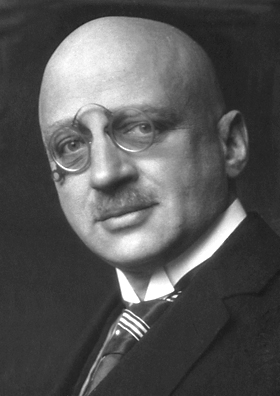 |
| Fritz Haber (1868-1934) |
His life was one of contradictions, coincidences, and tragedy. His first wife, Clara Immerwahr, who was also a chemist, committed suicide with Fritz's military pistol shortly after he returned from personally supervising the world's first military poison gas attack in Flanders, Belgium during WWI. Fritz had developed the poison gas used in the attacks. Their son, Hermann Haber also later committed suicide in 1946 after immigrating to the US.
The morning of Clara's suicide, Fritz left Berlin for the Eastern Front to supervise a gas attack on the Russians. Otto Hahn, who along with Lise Mietner discovered fission, was a member Haber's unit in the gas troops. To Hahn's credit, he later opposed the used of nuclear weapons.
Kaiser Wilhelm II gave Fritz the rank of captain for his service in WWI. However, all his service for Germany and what would now be considered war crimes or genocide, were later insufficient for the Nazis, even though he had converted from Hasidic Judaism to Lutheranism to prevent his vilification at their hands. Fritz had to flee Germany with his second wife and two sons. Members of Haber's extended family died at the hands of the Nazis in WWII in concentration camps.
And here is my connection to Fritz Haber. I visited a ghost town in Chile called Humberstone. It was a major center of the nitrate mining industry until the Haber process and the Great Depression made it uneconomic and led to its abandonment in 1960.
Of course, there are many other coincidences in the life of Fritz Haber, only a few I have touched here.
This brings many questions to mind, one being why is high school history so boring?
I never learned any history like this in my public high school. Perhaps if I had, it might have been less comatose inducing.











